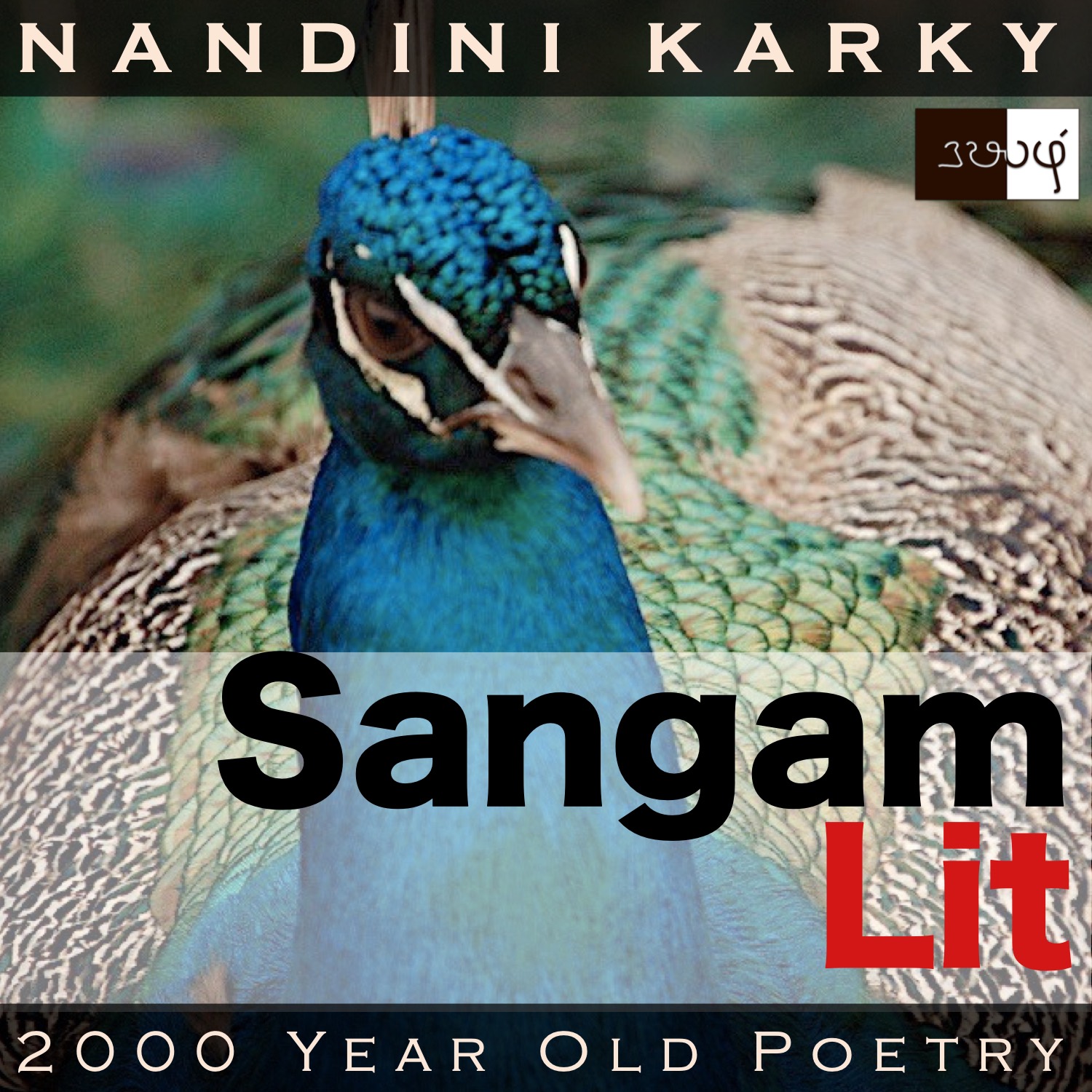Podcast: Play in new window | Download
Subscribe: Apple Podcasts | Spotify | Amazon Music | Android | iHeartRadio | TuneIn | RSS | More

In this episode, we observe ancient beliefs about health and marriage in a mountain country, as portrayed in Sangam Literary work, Natrinai 288, penned by Kulambanaar. Set in the hill landscape of ‘Kurinji’, the verse speaks in the voice of the confidante to the lady, passing on a hidden message to the man, listening nearby.
அருவி ஆர்க்கும் அணங்குடை நெடுங் கோட்டு
ஞாங்கர், இள வெயில் உணீஇய, ஓங்கு சினைப்
பீலி மஞ்ஞை பெடையோடு ஆலும்
குன்ற நாடன் பிரிவின் சென்று,
நல் நுதல் பரந்த பசலை கண்டு, அன்னை
செம் முது பெண்டிரொடு நெல் முன் நிறீஇ,
கட்டின் கேட்கும்ஆயின், வெற்பில்
ஏனற் செந் தினைப் பால் ஆர் கொழுங் குரற்
சிறு கிளி கடிகம் சென்றும், ‘இந்
நெடு வேள் அணங்கிற்று’ என்னும்கொல் அதுவே?
Opening with ‘அருவி ஆர்க்கும்’ meaning ‘where the waterfalls resound’, the verse extends us a warm invite to a moist mountain land. Not only there is rich moisture but also ‘gentle sunshine’ as can be seen in the words ‘இள வெயில்’. In this phrase, one can sense the looming trees here, filtering out the harshness of the sun and pouring just a nourishing warmth within. A warmth enjoyed by the ‘பீலி மஞ்ஞை’ or ‘peacock with fine feathers’. We are greeted by a familiar phrase ‘நல் நுதல் பரந்த பசலை’ meaning ‘the pallor of pining that has spread on the forehead’. A curious adjective for women appears in ‘செம் முது பெண்டிர்’ talking about ‘respected, old women’. ‘சிறு கிளி கடிகம்’ illustrates the prominent preoccupation of these mountain women, referring to ‘the chasing away of parrots’. The verse ends with ‘நெடு வேள் அணங்கிற்று’ meaning ‘Murugu has taken thee’ and nudges us to trek on further and see!
The man and lady had been leading a love relationship and the man was trysting with the lady, by day, in the millet fields she was guarding. Whenever the man left the lady, she languished in pining. Seeing these changes in the lady and intending to nudge the man into action, the confidante waits for an opportunity. One day, when the man arrives by, pretending not to notice him, the confidante says to the lady, “Near the tall peaks, resounding with the echo of cascades, the place where gods reside, intending to relish the tender sunshine, the feathered peacock that lives on those tall branches, joins with its female and dances. Such is the land of the lord from the mountains. Since he parted away, the pallor of pining spreads on your forehead. Seeing this, mother is sure to summon those virtuous, old women, and spread paddy in the front yard in order to divine the reason for your ill health. Even though we went to the red millet fields in the mountains to drive away little parrots, seeking to peck away at the milk-filled, luscious ears of the crop, will the soothsayers proclaim, ‘Therein, god Murugu took possession of her’?” With these words, the confidante is conveying to the man the need to take the lady’s hand in marriage without delay, by revealing the many imminent dangers.
Time to explore the nuances! The confidante starts her conversation with the lady by describing the man’s mountain country. She relays the sounds of cascades and talks about the soaring peaks where gods were said to reside. This belief is no doubt because of the awe those mighty mountains evoke in the eyes of mortals! Then, she turns the focus to a peacock and its mate, who have come away from their cozy nest on tall branches to relish the gentle sunshine in the hills! When researching about this, I was amazed to find a scientific article on how peacocks orient their position at a certain angle to the sun, during their mating rituals. The article further described that peacocks preferred an angle of 45% relative to the sun, so as to make their feathers appear at their best. While Sangam folks may not have measured the angle herein, they have understood two thousand years earlier about this mating behaviour of a peacock that seeks out the sun! Returning to our verse, the confidante has been taking us on this mountain tour only to show the man’s country. Whether subtext hides within, we will learn in a while.
From the man’s mountain country, the confidante moves to the lady’s home and she says since changes appear on the lady’s form whenever the man parts with her, mother, with her sharp eyes, has noticed this. Seeing her child in ill-health, she is sure to bring soothsayers to divine the reasons. We learn that these soothsayers were old women, who have been leading a life of virtue. Their methods are quaint, for they seem to spread paddy on the front yard and do some astrological calculations to see the past and future within those food grains. The confidante says that these women might conclude that this is the handiwork of god Murugu, who has taken possession of the lady, when she went to the millet fields to chase away parrots. The confidante finishes by asking whatever could they do if such a thing were to happen!
Why is it such a dreadful thing for the lady to be taken possession by god? The reason turns out it was not fitting for the lady’s chastity to have her illness attributed to god when the reason was the man, the lord of the mountains! Hearing this, the man would be jolted to act immediately and claim the lady’s hand in marriage, so that akin to that peacock and peahen, the man and lady can bask in the sunshine of a happy, married life. A moment to consider how those trusted methods of analysing illness in the ancient past seem obviously inefficient and inaccurate two thousand years later and whether our own twenty-first century, so-called advanced devices to analyse the same, will stand the test of time!




Share your thoughts...